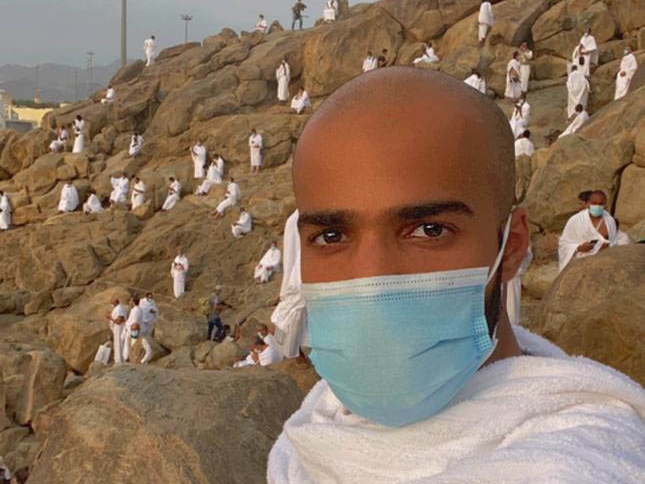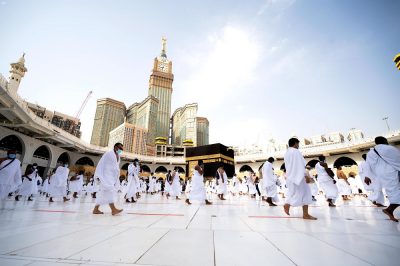A few hundred of pilgrims concluded Hajj on Sunday in a very unique atmosphere occasioned by the global pandemic, causing the ban of worshipers from outside Saudi Arabia.
Being one of front line health workers, Dr. Hamza Alherz was lucky to be among the chosen ones to perform hajj this year.
“This was my first time performing Hajj, it was just an amazing feeling,” he told The National via a Zoom call on his last day at the holy sites in Mina.
📚 Read Also: In Pictures: Pilgrims Converge on Arafat
Dr. Alherz, 30, is one of eight siblings, all doctors, who all answered the call to fight the deadly pandemic. Contracting the virus in the course of his work, he believes it was a blessing in disguise.
“God Almighty said: ‘you may hate a thing although it is good for you’ and I felt this verse in my situation and what happened to me,” Dr. Alherz said.
“Before I contracted the virus, all of us in the health sector were afraid of this happening. Then it happened to me,” he said. “When I got the news that I’m going for Hajj, I felt that the meaning of this holy verse truly applies to me.”

Dr Hamza Alherz at mount Arafat. Courtesy Dr Hamza Alherz
For him, the most touching moment in hajj was on the day of Arafat, July 30.
“I saw lots of footage before of Mount Arafat during Hajj, I saw how crowds of people had climbed it every year, it looked as if the mountain doesn’t exist, just pilgrims covering it,” he said.
Due to the limited numbers of pilgrims this year, the scene was different.
“We were able to go to the top of the mountain smoothly and pray at ease, it was an indescribable view.”
Burst into Tears
Nurse Manal Barnawi, who works in a hospital in Makkah, is another lucky pilgrim.
Though she has regularly visited the Grand Mosque, the past months in which it closed its doors to worshippers and Umrah were difficult for her.
“When I got off the bus, still in the yards away from the mosque, I burst into tears,” she said. “Then when I saw the Kaaba, I just stood in awe.”
She said at that moment she felt extreme gratitude to God, amazed that “Allah had chosen me from about two billion Muslims to be among the very few selected people to visit the holy mosque and perform Hajj this year”.
Barnawi and three colleagues were diagnosed with coronavirus on May 20.
“My symptoms were minor but I kept testing positive for a whole month,” she said. `Eid Al-Fitr, the holiday that follows Ramadan, was particularly hard for her.
“I had to spend all of the month of Shawwal alone.”
Though she performed hajj before as a child, Barnawi feels happy that God had granted her another chance to fulfill it this year.
“A lot of people were happy for me, some even envied me,” she said, laughing.
“But my father was the happiest person for me,” she said, adding that he is the one she is praying the most for because he is sick.
Hajj ceremonies symbolize the essential concepts of the Islamic faith. It commemorates the trials of Prophet Abraham and his family.
Every able-bodied adult Muslim who can financially afford the trip must perform Hajj at least once in a lifetime.

